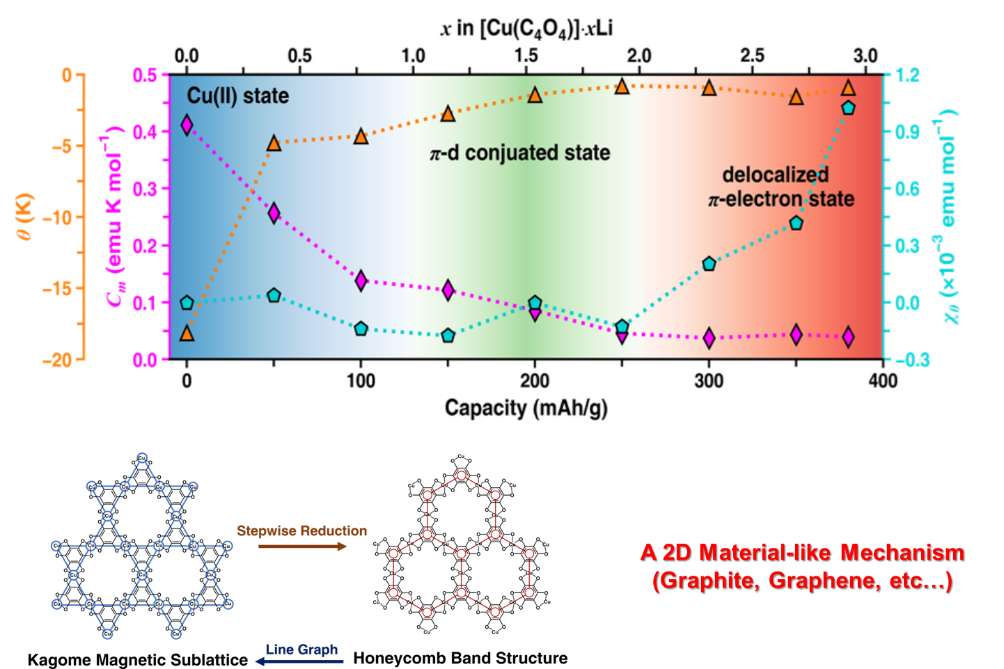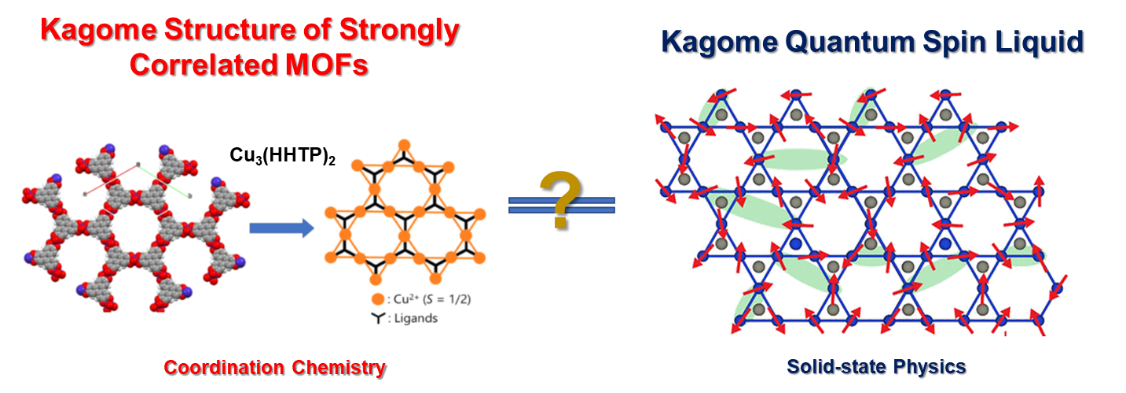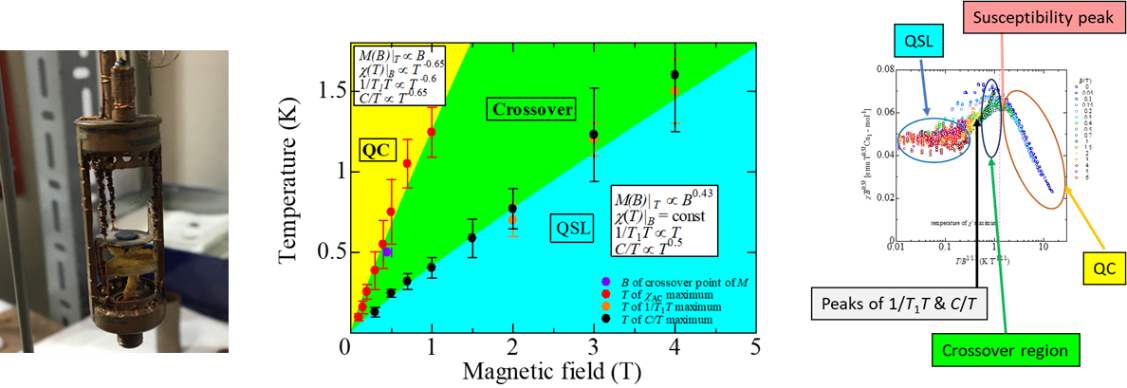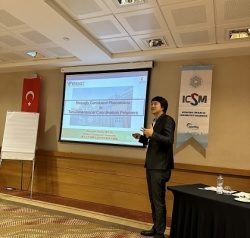STAFF

Dr. Zhongyue ZHANG
- Research Fields
- Coordination Polymers, Solid-state Electrochemistry, In situ Analyzing Techniques, Electronic and Magnetic States, Quantum Physical Properties
- Featured Article
- YouTube
- zhongyuezhang[at]kumamoto-u.ac.jp
*Please replace "[at]" with @.
Research interest
With completely tunable structures, coordination polymers have been one of the major research interests of chemists in the past decade. Via proper crystal engineering approach, various functionalities could be achieved for coordination polymer materials, leading to wide potential applications. Differ from the classic viewpoints which focus on the application of separation and catalysis, our research pursues the intriguing electronic and magnetic properties, as well as the unusual strongly correlated phenomena in coordination polymers and intend to build a bridge between the structural coordination chemistry and solid-state physics.
1, solid-state electrochemistry of coordination polymers.
By proper structural design, multiple redox active centers could be installed on a single coordination polymer and hence opened the opportunity of these materials being cathode materials of alkali-metal batteries with high gravimetric capacity and outstanding lifespan. A series of in situ spectroscopic methods, such as PXRD and XAFS, unearthed the unconventional electrochemical mechanism of the coordination polymers, including the long-overlooked reduction of metal cluster building blocks and the co-intercalation of both cations and anions from the electrolyte into the skeleton of coordination polymers.

2, electrochemical modulation to the electronic and magnetic states of materials.
It is well-established by us that the chemical valence of coordination polymers can be readily modified via the solid-state electrochemistry approach. As a result, it is rational to expect the modulation of electronic states, as well as the magnetic states and properties of materials while treated with solid-state electrochemical doping. Through variable in situ and ex situ magnetometric techniques, hidden magnetic phases as well as the conversion of electronic structures could be achieved for the target materials.
3, exotic quantum magnetic phenomena from strongly correlated coordination materials.
The quantum magnetic behaviors such as spin liquids, nematic phases and quasi-particle excitations are particularly of interest to the solid-state physicists, yet the number of target materials are rather limited as most of such phenomena arises from unique structural topologies of materials. Meanwhile, in the field of coordination chemistry, the well-established crystal engineering approach allows us to easily manipulate the structure of materials, yet the importance of such structural topology has never been emphasized. This research topic targets the borderline of coordination chemistry and solid-state physics by exploring the quantum magnetic properties in strongly correlated magnetic coordination polymers, and will demonstrate the potential of coordination polymers which may faithfully convert the structural topology to unique topological magnetism. 

Activities
Presentations
”the 8th International Conference on Superconductivity and Magnetism (ICSM2023)” (Turkey) May 4-11, 2023

Achievement
Publications
- 2024
-
- Purification and tailored functionalities in detonation nanodiamond
- Assembling Smallest Prussian Blue Analogs Using Chiral Hydrogen Bond-Donating Unit toward Complete Phase Transition
- Solvation/desolvation induced reversible distortion change and switching between spin crossover and single molecular magnet behaviour in a cobalt(ii) complex
- 2023
Grants
JGC-S Scholarship Foundation FY2023(「日揮・実吉奨学会」研究助成), "新奇な電子、電気化学特性を持つ2次元共役性MOFヘテロ構造体の開発", - Aug. 2025
Grant-in-Aid for Early-Career Scientists (The Japan Society for the Promotion of Science), ”Development of Metal-Organic Frameworks (MOFs) with Quantum Spin Liquid (QSL) States." April 2021-March 2024
- STAFF
-
- Wei XU
- Shinichiro Sawa
- Tetsuya KIDA
- Armando T. QUITAIN
- Junhua WANG
- Yoshihiro SEKINE
- Akira UEDA
- Yusuke INOMATA
- Muhammad Sohail AHMAD
- Jonas Karl N. AGUTAYA
- Nobleson KUNJAPPY
- Prafulla Bahadur MALLA
- Mohammad Atiqur RAHMAN
- Reetu Rani
- Kei TODA
- Tomoyasu MANI
- Agus Pulung SASMITO
- Tung Thanh TRAN
- Dario ZAPPA
- Daniel P. ZITTERBART
- Mitsuhiro AIDA
- U Rajendra ACHARYA
- Dmitri Aleks MOLODOV
- László PUSZTAI
- Yufeng ZHENG
- Gaochuang CAI
- Masahiko FURUTANI
- Hiroki MATSUO
- Zhongyue ZHANG
- Adam Karl SCHWARTZKOPFF
- Takashi ISHIDA
- Takumi HIGAKI
- Takahiro HOSONO
- Kei ISHIDA
- Makiko KOBAYASHI
- Ruda LEE
- Yuta NAKASHIMA
- Shin-Ichi OHIRA
- Atsushi SAINOKI
- Mitsuru SASAKI
- Keitaro TAKAHASHI
- Suttichai ASSABUMRUNGRAT
- Josep-Lluís BARONA-VILAR
- Nicorae BARSAN
- Jorge Norberto BELTRAMINI
- Olivier BOUTIN
- Paul BOWEN
- Pierre BREUL
- Maria Jose COCERO
- Patrice DELMAS
- Martin DIENWIEBEL
- Martino DI SERIO
- Derek ELSWORTH
- Carolina ESCOBAR
- Bruno FAVERY
- Etsuko FUJITA
- Tomonari FURUKAWA
- Jens HARTMANN
- Mohammad Abul HASNAT
- Yang JU
- Hoon KIM
- Ick Chan KWON
- Wen-Shing LEE
- Youn-Woo LEE
- Pavel LEJČEK
- Dongfang LIANG
- Bo LIU
- Tao LIU
- Hui LU
- Reiko ODA
- Yong Il PARK
- Shie-Ming PENG
- Christian RENTENBERGER
- Parasuraman SELVAM
- Amir SI LARBI
- Konstantinos Daniel TSAVDARIDIS
- Gioacchino (Cino) VIGGIANI
- Thomas WAITZ
- Yan XIAO
- Zhenghe XU
- Kazuki TAKASHIMA

